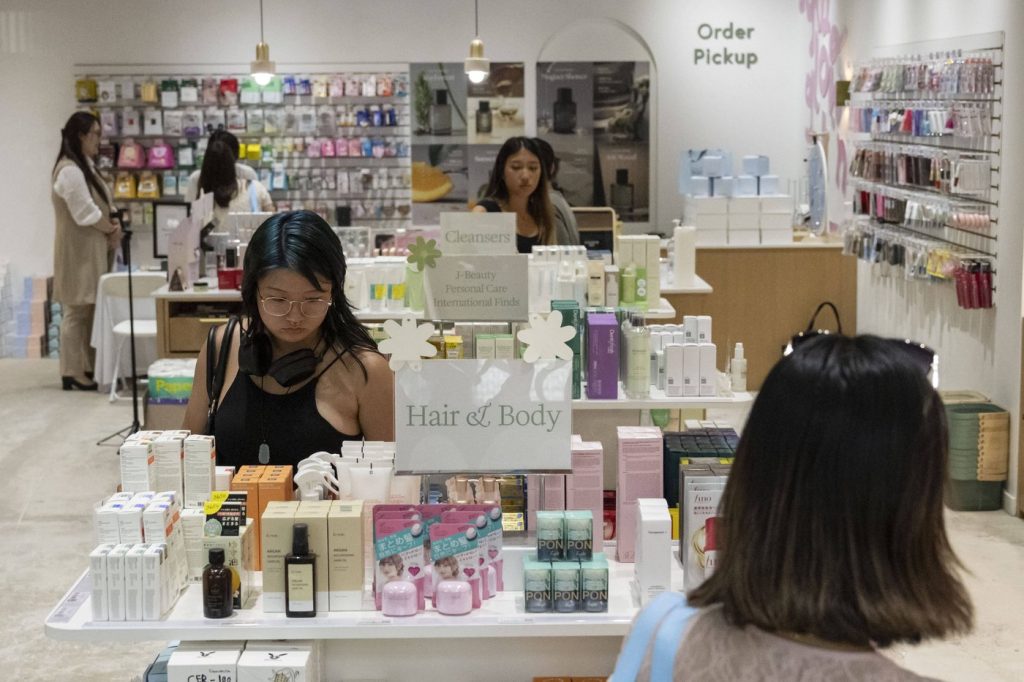NEW YORK (AP) — The potential imposition of a 25% tax on products from South Korea slated for import into the United States has sparked consumer reactions such as stockpiling. Amrita Bhasin, a 24-year-old, took precautions by purchasing 50 sheet masks from popular Korean brands like U-Need and MediHeal to stock up before the tariffs might take effect, highlighting the increased consumer awareness surrounding international trade policies.
As South Korea aims to finalize a trade agreement before the deadline set by President Donald Trump on August 1, the ramifications of these tariffs extend beyond the economic realm. A significant portion of the U.S. population, especially beauty enthusiasts, stands to be affected as the country is among the largest consumers of imported South Korean cosmetics.
The K-beauty trend has gained substantial traction globally, captivating consumers across Europe, North and South America, and increasingly in the Middle East. In the U.S., Korean cosmetics have achieved dominance, evolving from BB creams that combine moisturizer, foundation, and sunscreen to elaborate ten-step beauty routines. Exotic ingredients such as snail mucin and rice water have become highly sought after.
Statistics indicate that South Korea has surpassed all other nations in exporting skin care and cosmetic products to the U.S., with a reported import value of $1.7 billion in 2024, marking a staggering 54% increase from the previous year. This impressive growth underscores the American consumer's appreciation for the variety and quality offered by Korean beauty products.
Experts believe that although a 25% tariff might deter some purchasing, the unique characteristics of K-beauty may still maintain consumer interest. Mary Lovely from the Peterson Institute for International Economics notes that the appeal of Korean products isn’t solely based on price but also on the innovative offerings and the cultural cachet associated with them.
Senti Senti, a retailer specializing in international beauty products, reported early signs of "panic buying" among customers when the tariffs were first discussed. However, as the implementation of tariffs faced delays, the rush subsided. Manager Winnie Zhong noted that while the business has not yet passed on tariff-related costs to customers, a 25% tax could force price increases, impacting sales and customer behavior.
The situation for other retailers like Ohlolly is similarly precarious. Owners Sue Greene and Herra Namhie expressed concerns over the significant cost increase that a 25% tariff would pose, prompting them to halt restocks until more clarity emerges regarding the tariff agreements between the U.S. and South Korea. They currently hold only two to four months of inventory and are contemplating which products to continue offering under the looming uncertainty.
Concerns are also prevalent among beauty content creators. Jen Chae, a YouTube influencer with over 1.2 million subscribers, has altered her purchasing habits in light of the tariff talks. She paused orders from shops like YesStyle amid confusion over potential customs duties and their applicability to her promotional items as a creator.
Rachel Weingarten, a beauty newsletter writer, commented on the impracticality of stockpiling beauty products, citing issues such as natural oil rancidity and packaging vulnerabilities. She acknowledged that while personal pricing increases would not deter her completely, it would prompt her to explore a wider array of beauty products beyond just Korean options.
Despite the uncertainty surrounding tariffs, fans like Bhasin remain loyal to K-beauty, ready to absorb price hikes if necessary. Bhasin remarked on the lack of reliable alternatives in the U.S. market for Korean face masks, indicating a strong commitment to maintaining her skincare routine regardless of potential price increases.
As the trade discussions continue, the fate of South Korean beauty exports to the U.S. hangs in the balance, reflecting broader issues of international trade, consumer behavior, and the global beauty industry.











